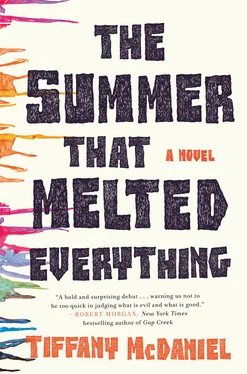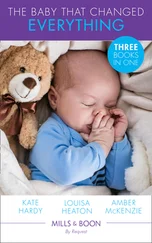“I guess to him, slicing open his arm was walking someone home. It was walking himself. And how can you be mad at him, Fielding, if he’s home now?”
Tears, such as Angels weep, burst forth
— MILTON, PARADISE LOST 1:620
THE NIGHT BEFORE Grand’s funeral, Dad sat on the porch, squinting his eyes, folding his arms, and crossing his legs. He hadn’t bothered turning on the porch light. In those dark days following Grand’s death, lights were rarely turned on. It was as if we no longer knew how to pull a lamp cord or flip a wall switch. We’d suddenly gone dumb of the way to light.
Darkness was everywhere for us then. A darkness so thick, it was near solid. And it was all over the place, from Dad’s silence to the creases of Mom’s tissues. Everywhere there were tissues. Some piled, some scattered, some on tables, and some you had to step over on the floor. If you did step on one, your foot would be wet, the snot and tears carried on your heel.
These tissues light as air but denting the ground beneath them. As we were dented. Every time we passed Grand’s quiet room. A dent. When we looked at his empty chair at the table. A dent. When we saw all those crumpled white tissues and thought of baseballs. Dent, dent, dent . We were scooped out, hollowed in, and pocketing darkness all over us.
Dad stopped shaving. His hair came straight from the bed. His cheeks puffy, a coming swell. In his mouth, you could hear thunder in the distance and his breath came humid and smelled like toothpaste laid aside.
He stopped wearing his suits and wore a T-shirt and pajama bottoms all day and days at a time. He didn’t eat. He was trying to get even in the bone with Grand. If you thought it was a shadow passing, it was probably Dad.
Sometimes I’d find him on his knees, thinking at first he was praying, then realizing his arms were out, reaching beyond the wall in front of him. Twitching his fingers slightly as if to say, Come on, come on back to me, now.
Mom got thinner everywhere too, especially her fingers, like unraveling spools of thread. While Dad seemed unable to move, Mom seemed unable to survive stillness. Always up, always moving and circling the drain lest she stop and be sucked down it.
She cleaned out closets, cleared shelves, tossed fresh flour out, not realizing she was bringing more emptiness in.
Age had finally found her. The smoothness she once had appeared to have run out of her like water. A lay of wrinkles that would ordinarily have taken years to put down seemed to have come overnight. In her, something had been dimmed. I found myself unable to pull the strength together to look at her eyes, like gashes on her face torn fresh every few seconds.
I saw her once in Grand’s room, pacing around his empty bed. She was singing the lullaby.
Down in the hills of Ohio,
there’s a babe at sleep tonight …
I watched her, unable to stop moving around his bed, hugging his old sweatshirt in her arms. After every verse of the lullaby, she would fall silent. I’d watch her mouth open slowly in that one syllable word, Why. Another verse, another why. Over and over again, she was trying to figure it out, all the while unable to stop moving.
Fedelia gave Mom something to help her relax. I thought it was working as I looked in at Mom, lying on the bed, her back to me. I tiptoed around her. Her eyes shut. Her fingers in her mouth. I pulled them out and found her nails bleeding. She’d bitten them down to the quick in her sleep, her teeth still grinding. I stayed there, holding her hands away from her mouth while her eyes tossed frantically under their lids, her teeth searching for something to gnaw.
Fedelia never left the house. She slept in one of the extra rooms. We needed her there. She seemed the only one out of all of us capable of continuing. She would ask me if I was hungry and give me something even though I said I wasn’t.
She’d sit by Mom and hold her hand and nod out to me as she said, “Don’t forget him, Stella. He needs you too, remember that now, child.”
She would sit by Dad and hold her hands up, showing him a crack and how it grew. “It’s gettin’ bigger and bigger, Autopsy. You have to be careful because if the crack gets too big, it’ll break your whole world wide open and destroy you. I know something about being destroyed. I know a thing or two about lettin’ cracks get outta hand. You can’t let that happen, Autopsy. You have got to get up from here. Shave your face. Put your suit on. Fielding needs his father. He doesn’t need a great, big crack.”
After Fedelia left, I found a pile of tissues beneath her pillow. Never once did she cry in front of us. She knew it would do us no good. We needed her to be the strong one. She could say Grand’s name without breaking into a million pieces, and she taught us how to do it one letter at a time. She could walk by his room and not get dented. We tried her walk. We dented less and less. Our faces got drier and drier, and we went from tissues to sleeves, to brief wiping on the backs of our hands before one day finding there was nothing to be wiped, at least not on the outside.
Sal had mourned with the rest of us. He seemed to drink a lot of water during those days as if to replenish what he lost by eye. He thought it was his fault. Grand’s death had made Sal’s ears sensitive to those accusations. He was finally listening to the people who said everything bad was him. That whole summer of great undoing, of great unrest. This made him unhinged. Loose. As if you turned his nose slightly to the right, you would unscrew the last piece holding him together and all at once he would collapse into a pile of broken bones and broken heart.
“Do you want me to leave, Fielding?” he asked one night, sitting on the floor of our bedroom, leaning back against the wall. The room dark, his voice more of the same. “I’ll leave if you want me to.”
I eased down and found his side, leaned into it. “I already lost one brother. How can you ask if I’d wanna lose another?”
Losing Grand turned me into the passed-by. Blue skies, they pass me by. Good days, they pass me by. Talk and joy pass me by. The reasons people laugh, the reasons they smile, pass me by. Whoosh, whoosh, passing me by.
When I had Grand, I loved forever. Now forever frightens me. Must it last so very long?
I can’t spell me without him. I mean that. His full name, Grandfather, takes out every letter of my own except for two I s and an L. Who am I with those things? I’m not who I once was. I am simply the teeny-tiny remains of him, this Fielding who had a brother and in that had everything.
I thought it’d get better, losing a brother. That’s what they say, isn’t it? All those books I’ve gotten, those meetings I’ve gone to. They all say it gets better. How can it get better for a brother like me who threw out ignorance too late?
Sometimes I throw out my apologies. I go to the store and I get a pack of baseballs. White. Red stitching. I use a red marker to match. I write, I’m sorry. And then I throw. I’ve thrown them everywhere. Down alleys. Off the side of the road. In fields, in parks, in other people’s yards. I throw. And then I wait. I wait to see if an eighteen-year-old god will appear and pick up the ball and come walking with it toward me, saying, It’s all right. I forgive you, little man.
That never happens. It never will. Forever is here, and it’s nothing but hurt over and over again.
The night before his funeral, I dreamed of him. It was a transparent dream, like I was looking at him through jars. A bit seedy too, like the jars once held strawberry jam.
Читать дальше












